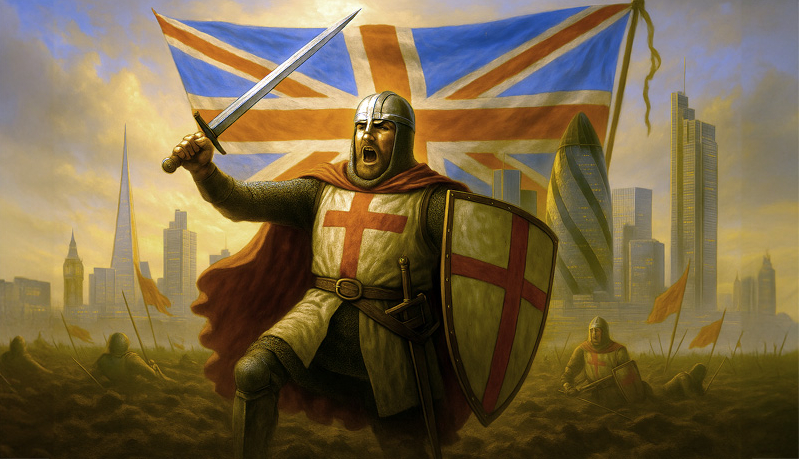
Every so often on social media platforms such as TikTok and Instagram, I come across posts like this one bemoaning that the UK is no longer a Christian country and that it is all the fault of the current government and immigrants.

Very often the photos include lots of Union Jack flags, or flags of St George, it isn’t unusual to see a Crusader or a lion or two, but the general message is that immigrants have taken over the UK and because of that we are no longer living in a Christian country.
There is a technical term for posts like these: "absolute tripe!"
Immigration is a real issue in the UK.
Firstly, let me address the elephant in the room. Immigration is a real issue in the UK. We are living through a period of extremely rapid social change, and immigration is one of the many factors involved in this transformation.
It is not surprising that some people are concerned about the pace of change. Unfortunately, there has been no serious discussion about peoples’ legitimate concerns, nor about how best to manage immigration and to integrate newcomers into the country. In the absence of serious public discussion, those on the far right of the political spectrum have filled the vacuum with anti-foreigner rhetoric.
It’s not my aim to discuss the wider issues of immigration other than to acknowledge that it is a complex question. My interest is in the “immigration has ruined our Christian Country” vibe and there are four points I’d like to make.
The decline in Christianity predates mass immigration
To blame the decline of Christianity in the UK on mass immigration (or, even more strangely, the 2024 UK Labour government) does not fit the evidence. The drop in church-going and religious affiliation in the UK has been going on for over 100 years.
Among those born between 1900 and 1909 in the English sample, 55 percent identify as Anglican and 16 percent as no religion. By comparison, among those born between 1980 and 1989 in the English sample, 9 percent identify as Anglican and 58 percent as no religion (from British Religion in Numbers).
If you are interested in really digging into this question, this 1993 paper by Field looks in detail at trends in church attendance between the wars.
Whatever the impact of immigration on church life in the UK (I will return to this later), the fact is that the decline in church attendance and Christian affiliation can be dated back to the 1800s. If the UK is no longer a “Christian country”, it is because white Anglo-Saxons stopped believing and no longer go to church.
What on earth is a “Christian country”?
People throw terms like “Christian country” around fairly freely, but what does it actually mean? I can think of a few possibilities:
- A country where the majority of people claim to be Christians.
- A country where the government and institutional Christianity are entwined in some way (for example, the King being the head of the Church of England).
- A country whose culture and institutions are strongly impacted by Christianity. (Tom Holland’s excellent book Dominion explores this theme in detail).
History is littered with massacres, betrayals and human rights abuses carried out in the name of our “Christian country”.
If you look at contemporary England, then point 2 definitely fits as does point 3, though to a decreasing extent. However, even when the majority of people in England (or Britain) claimed to be Christians, it does not mean that the country acted in a Christian fashion. History is littered with massacres, betrayals and human rights abuses carried out in the name of our “Christian country”.
For some reason, British Christian nationalists love the iconography of the crusaders (which is odd, as they didn’t originate from these islands). However, being objective, the crusades were one of the most shameful episodes in the history of the church and have caused the name of Jesus to be reviled in the Middle East a thousand years later. In case we forget, in 1204, Western crusaders sacked Constantinople and looted the largest city in the Christian world. These were not, in any meaningful way, soldiers of Christ.

The Bible is strangely silent on the notion of “Christian countries”. But there are numerous warnings about trusting “earthly powers” rather than God, and Scripture makes it abundantly clear that it is God who is in control, not nations, presidents, kings, oligarchs, or technocrats.
With that in mind, let’s think about the nature of the church itself. The first miracle of the church age was on the day of Pentecost, where people from across the Middle East were able to hear the message of the Apostles in their own languages. This is a clear indication that God desires the church to be a multicultural, multilingual entity.
Naturally enough, there were plenty of Jewish believers who were not convinced by this; they believed that the Jesus was a Jewish messiah and that the only way to join his movement was effectively to become Jewish. The Apostle Paul, who was himself a Rabi—trained in the best schools—led the charge against these Judaizers (as they were termed).
The battle between those who insisted that new Christians had to follow Jewish laws and Paul is waged on the pages of the Acts of the Apostles and in Paul’s epistles. It is in Revelation chapter 7 that we see Paul’s vision finally worked out:
"After this I looked, and there before me was a great multitude that no one could count, from every nation, tribe, people and language, standing before the throne and before the Lamb."
The church is composed of people from every nation, tribe, people and language. No one nation—not even the Jews—can claim special privilege. Salvation is through faith in Jesus, and this is independent of where you were born, or where your citizenship lies.
Pushing this on a bit further, a Christian’s primary allegiance lies with Christ, not with the nation they hail from. Our citizenship is in heaven (Phil 3:20). The book of Revelation contains a narrative in which the Empires of the world—powerful nations—are shown to be at enmity with God and his kingdom.
The only Christian country is the heavenly one that God’s people are called to.
There is nothing to stop a Christian from being patriotic, from supporting their national football team or having a deep love of the landscape and culture of their homeland. However, we must always be realistic and realize that our first loyalty is to Jesus and the Kingdom of God and that all human systems are fallen. The only Christian country is the heavenly one that God’s people are called to.
Christianity calls us to welcome the stranger
Ancient Israel was given many reminders that they had a duty to welcome foreigners into their land, because they too had lived in exile. However, it is Jesus who gives us the clearest indication of how we are to treat the disadvantaged.
"Then the King will say to those on his right, ‘Come, you who are blessed by my Father; take your inheritance, the kingdom prepared for you since the creation of the world. For I was hungry and you gave me something to eat, I was thirsty and you gave me something to drink, I was a stranger and you invited me in, I needed clothes and you clothed me, I was sick and you looked after me, I was in prison and you came to visit me.’" (Matthew 25:34-36)
And just in case the meaning wasn’t clear enough, he goes on to say:
"'Truly I tell you, whatever you did for one of the least of these brothers and sisters of mine, you did for me.’"
Now, this does not necessarily imply that a country should have an open border immigration policy, as I indicated at the start, this is a complex issue with many economic and social factors that need to be taken into account. However, what it does mean is that Christians are under an obligation to view the vulnerable people—and that includes many immigrants and asylum seekers—through the eyes of mercy and compassion. Automatic hostility to immigrants runs directly counter to our calling in Christ.
Immigration is reviving the church
So, getting back to the original photo. What exactly has happened to our beautiful “Christian country”? Well, for over a hundred years, the number of people going to church and identifying as Christians has been in a steep decline. Many African, Latin American and Asian countries have far higher numbers of people who identify as Christian than the UK.
What’s more, many of the immigrants that people complain about come from these very countries. While fewer and fewer white Brits identify as Christians, the steep decline in church attendance is flattening out because of the huge number of immigrants who are committed Christians.
People complain that immigrants are placing a huge burden on the NHS (National Health Service), while ignoring the fact that it couldn’t function at all without doctors and nurses from other countries. Our whole health system relies on immigration and a similar thing is true of the church in the UK. The churches that are growing and thriving tend to be big city churches with congregations that include a significant proportion of immigrants.
If Britain in 2025 has any claim to be a Christian country, then it is because of the number of immigrants.
More wonderfully still, we are seeing many people from countries where there are very few Christians coming to the UK and finding faith in Christ. If Britain in 2025 has any claim to be a Christian country, then it is because of the number of immigrants who are helping to bring new life to our church life.

To claim that Britain has (or had) some special status as a Christian nation and that we should therefore oppose people from other countries, cultures and faiths coming here is a denial of the very nature of the Christian faith. Be as anti-foreigner and anti-immigrant as you like, but don’t do it in the name of Jesus. And if you are a Christian, you’d better get used to the idea of being around people from other lands, because eternity is going to be full of them!
Originally published on Eddie Arthur's Substack. Republished with permission.
Dr Eddie Arthur has been a member of Wycliffe Bible Translators for over thirty years. For twelve years he and his wife Sue lived in Ivory Coast where they were part of the team translating the scriptures for the Kouya people. He is now based in the UK where he researches, writes, and talks about the future of global missions and provides contextual perspectives on societal change. Eddie's more recent writing can be found on his Substack "Living in the Venn Diagram".





